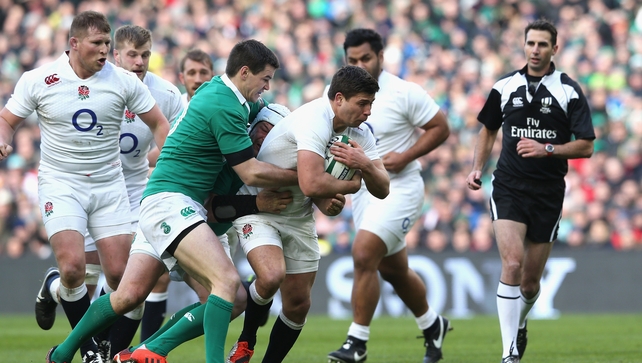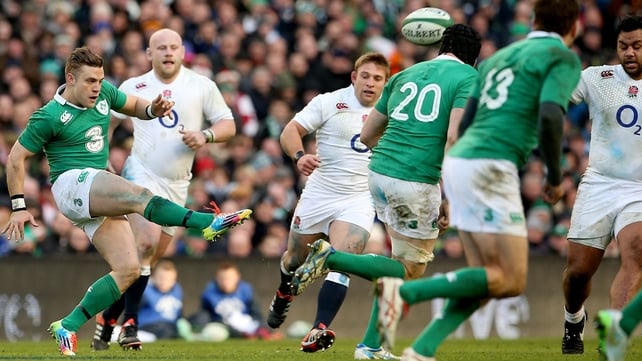By Tadhg Peavoy
Ireland now have the momentum in this championship.
It’s a buzzword in the Six Nations but it’s true. Three wins on the trot, part of a ten-game winning sequence, has developed a confidence, mental steel and toughness that has put Ireland in a place where this championship is theirs to lose.
What’s more, looking ahead to the Rugby World Cup this coming autumn, If Ireland and England win their respective pools, there is every likelihood they will face-off in a semi-final on 25 October at Twickenham.
If Ireland had gone into that potential tie with five defeats on the bounce to the English, it would have been a huge mental boost to Stuart Lancaster’s charges. Now that momentum has been reversed; to an extent anyway: The Irish still haven’t won at Twickenham since 2010, and that will leave England with a chunk of healthy confidence that they can claim another home win over the men in green.
Joe Schmidt's charges have the momentum, but what struck me in the tunnel and mixed zone after the game was the utter dejection of the England players.
George Ford, Billy Vunipola and Jack Nowell were visibly distressed and shaken by the defeat. Stuart Lancaster’s side will come back from this defeat and be a better team because of it - make no mistake. And when they do come back, Ireland need to be ready to adapt again and once more change the game plan.
Welsh challenge will be brutal
And on to Wales – another brutal challenge. The most successful side in the history of the championship - with 26 titles and 12 Grand Slams - never go gentle into that good night, to quote one of the Principality’s famous countrymen.
They will be buoyed by their magnificent win over France in Paris and feel that they can do a job on Ireland.
Their performance on Saturday was like the Wales of 2012 or 2013, blending physicality with guile and finesse, and France, who also delivered a performance to be proud of, were outfought but most crucially outthought.
If Wales can defeat Ireland in Cardiff on 14 March they will draw level on six points with Joe Schmidt’s team and be smack bang in contention for the title. Their motivation will be at its zenith, and what’s more, they have revenge on the their minds following their 26-3 humbling in Dublin last year when they were totally outclassed.

Since the advent of the Six Nations in 2000 Ireland-Wales has become one of the most difficult ties to call and this one will be no different.
Ireland simple yet effective
The game plan on Sunday was what we expected from Ireland: a retention-based game, with low risk the mantra, keeping the ball until the opposition are forced into conceding penalties for the metronomic Johnny Sexton to nail.
Underpinning all of that was a defence of such impressive quality that it now has to be ranked as the best in Europe, for February at least. March will show us whether that statement is really true.
The line speed was fierce and suffocated England from 9-13 and made sure their back three had neither enough space nor possession to do damage.
Sexton was the leader of this element of Ireland’s game, marshaling the defence from No 10 and making two textbook hits on George Ford in the first half which were inspirational to his team.

The centre combination of Robbie Henshaw and Jared Payne is also beginning to gel. In defence they look so solid together, but going forward there is still more needed and, I feel more to come.
In the first half, Sexton used Tommy O’Donnell as a pivot between he and Henshaw on the burst for Ireland’s only line break of the day.
That moment of creativity was a hint of what could be yet to come from the Ireland midfield axis; a glimpse into a future game plan of Mr Schmidt’s when – and if – he decides to unlock a chest of more expansive tricks for his back line to use.
More control needed in the final quarter
Sexton’s control throughout was masterful and he looked every bit one of the best players in the world.
But Ian Madigan had an average game when he replaced Sexton on 54 minutes. His control and calm was below the quality required of an international out-half and that led to Ireland losing momentum. He has to work on closing out games when Ireland have their noses in front. His lack of game time at No 10 for Leinster this season has no doubt affected his ability to do that. He can improve.

Ireland’s lack of dominance in the final quarter of ties is now also a concern; it has become a pattern. They have done it against New Zealand in 2013, France in 2014 and 2015, Australia in 2015 and now England in 2015.
One gets the distinct feeling that if Ireland are to win a Grand Slam or championship in 2015, then that last-quarter performance needs to be far more dynamic from the whole team, and Madigan in particular, against both Wales and Scotland.







